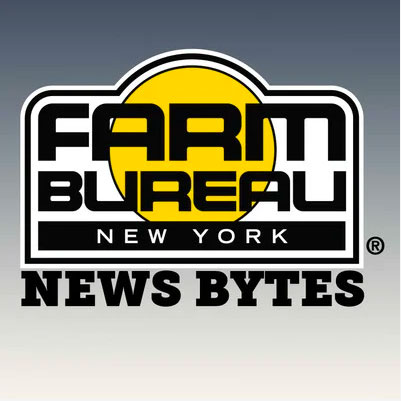New York State Poultry Farmers Protect their Flocks Amid HPAI Outbreak
NYFB Assistant Director of Public Affairs
An outbreak of Highly Pathogenic Avian Influenza (HPAI), first reported in Indiana this February, is now affecting birds in New York and in 29 other states.
New York Department of Environmental Conservation (DEC) announced on April 20 that the virus has been found in multiple wild bird species in several areas of New York State.
To date in New York, HPAI has been found in captive chickens, pheasants, and ducks in Dutchess, Ulster, Monroe, and Fulton counties. HPAI was detected in free-ranging wild birds in Cayuga, Clinton, Montgomery, Monroe, Onondaga, Seneca, Suffolk, Nassau, Livingston, and Wayne counties. Wild birds confirmed as infected include snow geese, Canada geese, tundra swan, mute swan, sanderling, mallard duck, redhead duck, ring-necked duck, wood duck, hooded merganser, great blue heron, bald eagles, great horned owls, snowy owl, cooper’s hawk, red-tailed hawk, fish crow, and turkey vulture.
Many species of waterfowl, including shorebirds, gulls, raptors, herons, and cranes, are also vulnerable. Small songbirds have not been affected in New York or other states. Confirmed wild bird cases are listed on the USDA website and shown on the U.S. Geological Survey map.
Taking Strict Precautions
New York poultry farmers are protecting their farms by using biosecurity plans and instructions from the USDA’s Animal and Plant Health Inspection Service (APHIS) website.
“We have been participating in all the different trainings through USDA and Cornell Cooperative Extension and following any guidance that’s out there from the industry. No visitors are allowed on our farm. When people call to make purchases, we tell them where they can buy local,” said Christina Hudson Kohler of Hudson Egg Farms in Eldridge, NY (Onondaga County).
“We’re also not allowing outside vehicles on the farm and regularly washing our own vehicles and car mats,” Kohler said. “We’re reminding our employees to avoid lakes and ponds and if they do visit those areas, to not wear those shoes to work.” Employees are asked to wear a specific pair of shoes that they leave at the farm and to not wear clothing, such as sweatshirts, two days in a row.
Corine Giroux, DVM, the on-site veterinarian at Giroux’s Poultry Farm in Chazy, NY (Clinton County) says the company has been following biosecurity measures.
“Every vehicle that comes on-premises has to have their tires and undercarriage disinfected before coming on-site, and we have a gatehouse at the entrance to our farm with a security person manning it all the time who disinfects tires,” she said.
“Employees have farm-dedicated shoes that don’t leave the farm. Most everyone is wearing some sort of coverall on top of their regular clothes. We are really careful about who we let on the farm including vendors and visitors. We aren’t letting anyone in until avian influenza has passed,” she said.
Virus Caused by Wild Birds
Avian influenza (AI) is caused by an influenza virus carried by free-flying wild birds such as ducks, geese, gulls, and shorebirds. Generally, influenza viruses can infect some wildlife species without causing signs of disease, but new strains can emerge that cause illness with high mortality in both wild birds and domestic poultry. These strains are designated as highly pathogenic, or HPAI.
HPAI outbreaks in wild birds are often cyclical and tied to migration when birds are concentrated in large numbers. As birds spread out on the landscape during the nesting season, disease transmission is expected to decrease.
The New York State Department of Agriculture and Markets (NYSDAM) announced on April 14 that it has issued an order to ban all fowl auctions and other events for the purchase, sale, swap, or trade of fowl in New York State to help prevent the spread of the virus.
The ban will remain in effect until further notice. The department is continuing close monitoring of HPAI in New York State and plans to reassess the Notice of Order in late May to determine whether it should remain in place through the summer fair season. As the HPAI outbreak spreads in other parts of the United States, several additional states have taken the step to ban poultry exhibitions and/or gatherings of poultry, including Arkansas, Iowa, and Georgia.
DEC is working cooperatively with NYSDAM and the USDA Animal and Plant Health Inspection Service, the agencies leading the joint HPAI incident response, as well as the State Department of Health and Cornell University.
HPAI Origin
This recently detected HPAI strain likely came from Europe, where it has been circulating since 2020. Since late November 2021, the HPAI H5N1 Eurasian strain began being detected across North America. This outbreak expanded rapidly in mid-March 2022 in North America and HPAI has been detected in many other states, including those that share a border with New York. In February 2022, the first case of HPAI in New York was found in Suffolk County in a domestic flock. Since that time, AGM has detected HPAI in domestic poultry flocks, gamebird breeder facilities, and shooting preserves.
Natalie Kreher, who works in sales at Kreher Family Farms in Clarence, NY (Erie County) says her farm is also taking measures including restricting on-farm visits to essential employees only and using additional disinfecting procedures with vehicles entering onto our farms.
“As egg farmers, we take disease prevention seriously every day, but in times like this, we have looked for opportunities to improve our biosecurity measures. Our team is doing all we can to keep our hens safe and healthy,” she said.
No known HPAI human infections are documented in the U.S., and according to the U.S. Centers for Disease Control and Prevention, these recent cases of HPAI do not present an immediate public health concern.
Poultry biosecurity materials and checklists can be found on the USDA’s “Defend the Flock” website.
To report sick birds, unexplained high number of deaths, or a sudden drop in egg production, please contact the Department’s Division of Animal Industry at 518-457-3502 or the USDA at 866-536-7593.



